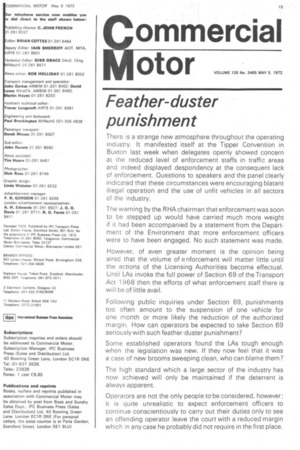Feather-duster punishment
Page 15

If you've noticed an error in this article please click here to report it so we can fix it.
There is a strange new atmosphere throughout the operating industry. It manifested itself at the Tipper Convention in Buxton last week when delegates openly showed concern at the reduced level of enforcement staffs in traffic areas and indeed displayed despondency at the consequent lack of enforcement. Questions to speakers and the panel clearly indicated that these circumstances were encouraging blatant illegal operation and the use of unfit vehicles in all sectors of the industry.
The warning by the RHA chairman that enforcement was soon to be stepped up would have carried much more weight if it had been accompanied by a statement from the Department of the Environment that more enforcement officers were to have been engaged. No such statement was made.
However, of even greater moment is the opinion being aired that the volume of e nforcement will matter littl.e until the actions of the Licensing Authorities become effectual. Until LAs invoke the full power of Section 69 of the Transport ACT 1968 then the efforts of what enforcement staff there is will be of little avail.
Following public inquiries under Section 69, punishments too often amount to the suspension of one vehicle for one month or more likely the reduction of the authorized margin. How can operators be expected to take Section 69 seriously with such feather-duster punishment?
Some established operators found the LAs tough enough when the legislation was new, If they now feel that it was a case of new brooms sweeping clean, who can blame them?
The high standard which a large sector of the industry has now achieved will only be maintained if the deterrent is always apparent.
Operators are not the only people tcr be considered, however: it is quite unrealistic to expect enforcement officers to continue conscientiously to carry out their duties only to see an offending operator leave the court with a reduced margin which in any case he probably did not require in the first place.




























































































